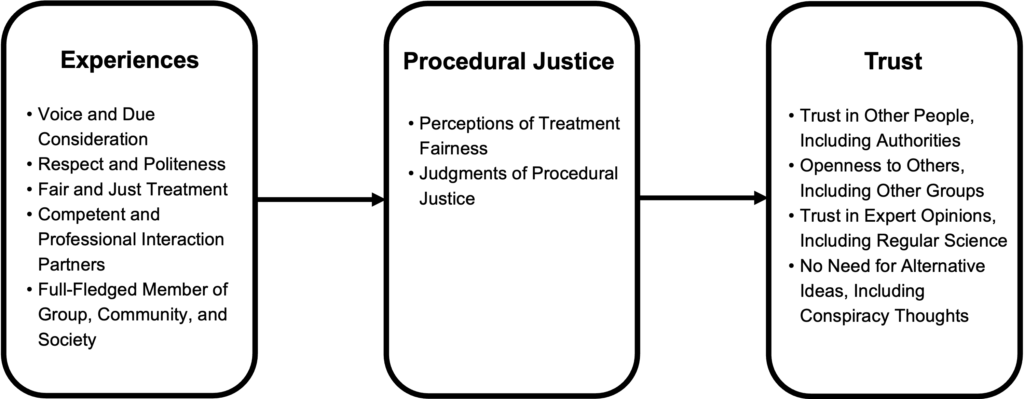
Discontent in Society
In my recent book, ‘The Fair Process Effect,’ I aim to provide a framework for understanding and possibly managing various conditions of discontent in our societies. The book studies antecedents of societal distrust, heightened polarization, and increased levels of conspiracy thinking. The book analyzes these different instances of discontent in society, focusing on three key points:
(1) Distrust, polarization between individuals and groups, and conspiracy thinking play an important role in our world and seem to occur more and more frequently across our globe. Thus, what we can do to somehow manage these instances of social discontent deserves our attention.
(2) It can be quite hard to handle these issues. Therefore, we need scientifically grounded tools that help to prevent that unwarranted levels of distrust, polarization, and conspicuous thoughts do arise and inflate to levels that democratic societies cannot deal with in legitimate and orderly ways.
(3) It is crucial that we as individuals, groups, and societies allow for, and indeed applaud, appropriate critical attitudes of the various terrible things that are going wrong in our world. In other words, we should not go overboard and respond too harshly to every occurrence of some form of discontent in our societies.
The Fair Process Effect
I argue that the science of what has become known as the fair process effect provides a framework for how to respond to these points. When people are treated in a polite manner and with respect, when they are able to voice their opinions, and when their opinions are seriously listened to by competent and professional authorities and others who matter, then it is likely that the fair process effect will occur. That is, when people thus feel fairly and justly treated, and hence feel to be members of their group, community, or society that matter, they are more likely to trust other people and are more willing to work together with them in cooperative ways and to do what is good for society at large.
As the ‘Fair Process Effect’ tries to explain in more detail, the fair process is a psychological phenomenon that can help to repair important instances of distrust, can temper hot and affective reactions within and between polarized groups, and may help to prevent suspicious ideas about conspiracies among elites or other authorities in this world.
Trust
The ‘Fair Process Effect’ explains in detail why trust plays an essential role to understand the fair process effect. That is, the figure shown here illustrates the general model studied in the book. The model assumes that various experiences in people’s lives lead to perceptions of treatment fairness and judgments of procedural justice. These perceptions in turn tend to result in more trusting responses to other people, groups, and societal institutions.
The fair process effect has been shown in many different domains of human life and quite often is surprisingly powerful in unleashing the prosocial quality of many individuals. People are also very good at distinguishing sincere instances of fair and just treatment from not so sincere attempts to lure them into something that is not good for them and not so well-intended. This makes the fair process effect quite sturdy against potential abuse by persons with no-good intentions. To be explicit, the fair process effect is not a mechanism that can be used to mend everything that needs to be mended in this world, but the effect is conceptually rich, empirically robust, and practically relevant such that it can help to start overcoming at least some crucial issues of discontent in our various societies.

Not Pampering People
The important role of respectful and polite communication, which plays an important role in the functioning of the fair process effect, does not imply that fair treatment or perceived procedural justice can or should be equated with the pampering of people. Quite the contrary. For example, when people are demanding that radical changes need to take place in society, the procedural justice literature suggests that it is crucial that these persons should be able to voice their opinions and that due consideration to these opinions should be paid at proper moments where their opinions can be meaningfully taken into consideration when important decisions are being made. In other words, people have the right to a fair process, even when their opinions diverge sharply from majority rule. These rights should be defended by the legal system, other social institutions, and democratic principles should be made to function in such a way that these rights are indeed secured and defended when necessary.
Importantly, the rights of recipients of fair process go together with proper attention to the duties that all people have. In my opinion, this includes respect for the rule of law, the adherence to democratic norms and values, the communication of your concerns in polite manners whenever possible, and the willingness to achieve your goals by peaceful means. All this does not mean that one cannot and should not be critical about how laws are constructed, how law enforcement is taking place, what court rulings are made, and how the democratic or not so democratic system in one’s country functions. Certainly not. However, it is crucial to stay within the boundaries of law whenever possible and to try to achieve changes in peaceful manners within the boundaries of the democratic system.
Constructive yet Critical Approach
Psychological research can legitimize the existing status quo. Perhaps not intentionally, but a focus on what people think, feel, and do can distract and direct attention away from important issues that are wrong in society and that cannot be overcome with some opportunities to voice your opinions. Indeed, research shows that when repeated voice opportunities are followed by rejection of the opinions being ventilated this can lead people to become frustrated and angry about the blockage of their goals. Furthermore, the granting of voice should be genuine in order for it to be perceived as procedurally fair. Thus, the fair treatment cannot be a scam and still have positive effects on people’s reactions.
Related to this, I note explicitly that this book focuses mainly on exaggerated instances of distrust of science, polarization among diverse stakeholders, and illogical conclusions based on objectively false premises and sometimes emotional extremes of others whose polarizing influences are objectively misguided.
Thus, I zoom in onto the erosion of trust in experts in science or authorities such as judges that fulfill pivotal functions in our societies. This focus should not be understood to mean that there is an absence of lousy scientists or that there are no underperforming judges or other malfunctioning societal authorities and institutions that may well contribute to their credibility challenges. It is important, indeed crucial, to stay critical about the current state of science, our legal system, and other societal institutions. It would be wrong to take any form of distrust in scientists or societal authorities (including government and judges) to be wrong and misguided. I do work from a truly academic, thus critical but also constructive approach toward science and the dissemination of scientific insights as well as governmental agencies and the functioning of the legal system. It is this critical-constructive attitude that drives my scientific research on the fair process effect and that also provides a major impetus of the book discussed briefly here.
Latest Comments
Have your say!